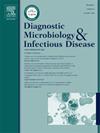Detection of bacterial vaginosis-associated bacteria and outcomes during clinical gynaecological conditions using qPCR: A retrospective cohort study
IF 1.8
4区 医学
Q3 INFECTIOUS DISEASES
Diagnostic microbiology and infectious disease
Pub Date : 2025-08-15
DOI:10.1016/j.diagmicrobio.2025.117065
引用次数: 0
Abstract
Endometriosis, chronic endometritis (CE), unexplained infertility (UI), and recurrent pregnancy loss (RPL) are gynecological conditions frequently associated with inflammation and alterations in the endometrial microbiome. The presence of bacterial vaginosis-associated bacteria (BVAB) and the expression of CD138 may influence clinical outcomes. We evaluate the relationship between endometrial BVAB detection via qPCR, CD138 marker expression, prior antibiotic treatment, and the number of miscarriages. A retrospective single-center cohort study was conducted on 86 women with endometriosis, CE, UI, and/or RPL. Endometrial samples were collected and analysed using the Allplex™ Bacterial Vaginosis Plus qPCR assay (SeegeneⓇ). Demographic data, CD138 expression, antibiotic usage, and miscarriage history were recorded and statistically analysed. CD138 expression was positive in 44.2% of cases. BVAB were detected in 31.4% of patients, with Lactobacillus spp. (median Log10 copies/reaction 1.56) and G. vaginalis (median Log10 copies/reaction 0.81) being the most common. A significant inverse association was found between CD138 positivity and BVAB detection (p < 0.05, OR = 0.31), suggesting reduced BVAB presence in inflamed endometria. No significant association was found between BVAB detection and prior antibiotic therapy or number of miscarriages. A significant correlation was found between negative BVAB qPCR results and positive CD138 expression, indicating a potential link between endometrial inflammation and microbiome alterations. However, antibiotic treatment did not significantly impact BVAB presence, and no association was found with miscarriage frequency. Further studies using vaginal swabs, healthy controls, and microbiome next-generation sequencing are needed to clarify these associations.
使用qPCR检测细菌性阴道病相关细菌和临床妇科疾病的预后:一项回顾性队列研究
子宫内膜异位症、慢性子宫内膜炎(CE)、不明原因不孕症(UI)和复发性妊娠丢失(RPL)是经常与炎症和子宫内膜微生物群改变相关的妇科疾病。细菌性阴道病相关细菌(BVAB)的存在和CD138的表达可能影响临床结果。我们通过qPCR评估子宫内膜BVAB检测、CD138标志物表达、既往抗生素治疗和流产次数之间的关系。对86例子宫内膜异位症、CE、UI和/或RPL患者进行了回顾性单中心队列研究。收集子宫内膜样本并使用Allplex™细菌性阴道病Plus qPCR检测(SeegeneⓇ)进行分析。记录人口统计数据、CD138表达、抗生素使用和流产史并进行统计分析。CD138阳性表达率为44.2%。31.4%的患者检测到BVAB,其中乳杆菌(Lactobacillus spp.)(中位数Log10拷贝/反应1.56)和阴道芽孢杆菌(中位数Log10拷贝/反应0.81)最为常见。CD138阳性与BVAB检测呈显著负相关(p < 0.05, OR = 0.31),提示炎症子宫内膜中BVAB的存在减少。BVAB检测与既往抗生素治疗或流产次数无显著关联。BVAB qPCR阴性结果与CD138阳性表达之间存在显著相关性,表明子宫内膜炎症与微生物组改变之间存在潜在联系。然而,抗生素治疗并没有显著影响BVAB的存在,也没有发现与流产频率相关。需要使用阴道拭子、健康对照和下一代微生物组测序进行进一步的研究来澄清这些关联。
本文章由计算机程序翻译,如有差异,请以英文原文为准。
求助全文
约1分钟内获得全文
求助全文
来源期刊
CiteScore
5.30
自引率
3.40%
发文量
149
审稿时长
56 days
期刊介绍:
Diagnostic Microbiology and Infectious Disease keeps you informed of the latest developments in clinical microbiology and the diagnosis and treatment of infectious diseases. Packed with rigorously peer-reviewed articles and studies in bacteriology, immunology, immunoserology, infectious diseases, mycology, parasitology, and virology, the journal examines new procedures, unusual cases, controversial issues, and important new literature. Diagnostic Microbiology and Infectious Disease distinguished independent editorial board, consisting of experts from many medical specialties, ensures you extensive and authoritative coverage.

 求助内容:
求助内容: 应助结果提醒方式:
应助结果提醒方式:


